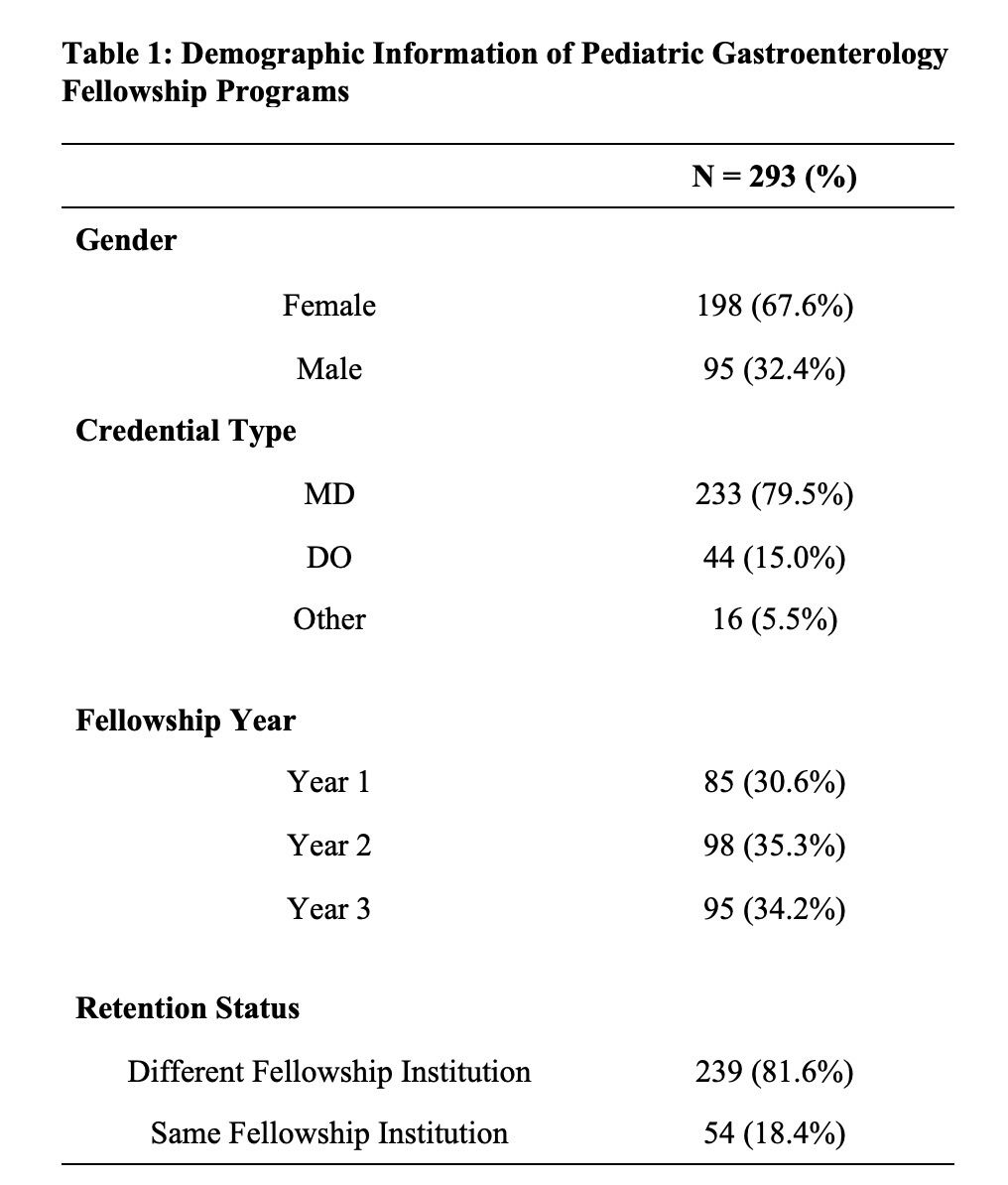Sunday Poster Session
Category: Pediatrics
P1887 - Geographic Retention and Demographic Trends in Pediatric Gastroenterology Fellowship Programs
Sunday, October 26, 2025
3:30 PM - 7:00 PM PDT
Location: Exhibit Hall

Angeli Sirilan, BS, BA (she/her/hers)
University of Arizona College of Medicine - Phoenix
Phoenix, AZ
Presenting Author(s)
Angeli Sirilan, BS, BA1, Annie Jia, BS1, Sophie Nguyen, BS2, Kinsley Wang, BS1, Michelle Gonzalez, MD3
1University of Arizona College of Medicine - Phoenix, Phoenix, AZ; 2University of Arizona College of Medicine, Phoenix, Phoenix, AZ; 3Mayo Clinic College of Medicine and Science, Scottsdale, AZ
Introduction: Gastroenterology has historically been a male-dominated field, although recent years have seen increasing numbers of female physicians entering the specialty. Female American medical graduates represent the largest and growing proportion of several pediatric subspecialties, including gastroenterology. This study aims to describe the demographic characteristics of current Pediatric Gastroenterology (PGI) fellows.
Methods: This cross-sectional study analyzed publicly available data from ACGME-accredited Pediatric Gastroenterology fellowship programs in 2025 (n = 70). Information was collected from the American Medical Association's FREIDA database and program websites via Google Search between May 22-26, 2025. Fifteen programs lacking publicly available data on current fellows were excluded from the analysis. Data collected includes gender, credentials, and geographic region of medical school and residency based on AMA Medical Student Section (MSS) regional categories. Statistical analysis was performed using chi-square tests in Stata to compare representation across groups. Statistical significance was defined as p < .005; p < .01 was also reported.
Results: Among 293 current PGY-3 to PGY-6 PGI fellows, 67.6% were female. The majority of PGI fellows held MD degrees (80.2%), while 15.0% held DO degrees. Overall institutional retention from residency was 18.4%, with Region 3 (South) having the highest retention at 37.5% (p < 0.001). Region 3 had the highest in-region progression from medical school to residency (69.0%) while 51.6% of Region 2 residents remained in-region for residency (all p < .001). International medical graduates (IMGs) represented 31.7% of fellows. There were no significant differences in gender distribution across regions or training year nationwide (p = .15).
Discussion: PGI fellowship programs show a higher proportion of female and DO physicians compared to adult gastroenterology fellowships. These findings underscore regional disparities in trainee retention and the growing diversity within pediatric gastroenterology. Further research is warranted to inform strategies aimed at improving geographic workforce distribution and representation within the field.
1Medical Student Section (MSS) Regions. American Medical Association. July 11, 2023. Accessed May 27, 2025. https://www.ama-assn.org/member-groups-sections/medical-student-section-mss/medical-student-section-mss-regions

Figure: Table 1: Demographic Information of Pediatric Gastroenterology Fellowship Programs

Figure: Table 2: American Medical Association Medical Student Sections Map (1)
Disclosures:
Angeli Sirilan indicated no relevant financial relationships.
Annie Jia indicated no relevant financial relationships.
Sophie Nguyen indicated no relevant financial relationships.
Kinsley Wang indicated no relevant financial relationships.
Michelle Gonzalez indicated no relevant financial relationships.
Angeli Sirilan, BS, BA1, Annie Jia, BS1, Sophie Nguyen, BS2, Kinsley Wang, BS1, Michelle Gonzalez, MD3. P1887 - Geographic Retention and Demographic Trends in Pediatric Gastroenterology Fellowship Programs, ACG 2025 Annual Scientific Meeting Abstracts. Phoenix, AZ: American College of Gastroenterology.
1University of Arizona College of Medicine - Phoenix, Phoenix, AZ; 2University of Arizona College of Medicine, Phoenix, Phoenix, AZ; 3Mayo Clinic College of Medicine and Science, Scottsdale, AZ
Introduction: Gastroenterology has historically been a male-dominated field, although recent years have seen increasing numbers of female physicians entering the specialty. Female American medical graduates represent the largest and growing proportion of several pediatric subspecialties, including gastroenterology. This study aims to describe the demographic characteristics of current Pediatric Gastroenterology (PGI) fellows.
Methods: This cross-sectional study analyzed publicly available data from ACGME-accredited Pediatric Gastroenterology fellowship programs in 2025 (n = 70). Information was collected from the American Medical Association's FREIDA database and program websites via Google Search between May 22-26, 2025. Fifteen programs lacking publicly available data on current fellows were excluded from the analysis. Data collected includes gender, credentials, and geographic region of medical school and residency based on AMA Medical Student Section (MSS) regional categories. Statistical analysis was performed using chi-square tests in Stata to compare representation across groups. Statistical significance was defined as p < .005; p < .01 was also reported.
Results: Among 293 current PGY-3 to PGY-6 PGI fellows, 67.6% were female. The majority of PGI fellows held MD degrees (80.2%), while 15.0% held DO degrees. Overall institutional retention from residency was 18.4%, with Region 3 (South) having the highest retention at 37.5% (p < 0.001). Region 3 had the highest in-region progression from medical school to residency (69.0%) while 51.6% of Region 2 residents remained in-region for residency (all p < .001). International medical graduates (IMGs) represented 31.7% of fellows. There were no significant differences in gender distribution across regions or training year nationwide (p = .15).
Discussion: PGI fellowship programs show a higher proportion of female and DO physicians compared to adult gastroenterology fellowships. These findings underscore regional disparities in trainee retention and the growing diversity within pediatric gastroenterology. Further research is warranted to inform strategies aimed at improving geographic workforce distribution and representation within the field.
1Medical Student Section (MSS) Regions. American Medical Association. July 11, 2023. Accessed May 27, 2025. https://www.ama-assn.org/member-groups-sections/medical-student-section-mss/medical-student-section-mss-regions

Figure: Table 1: Demographic Information of Pediatric Gastroenterology Fellowship Programs

Figure: Table 2: American Medical Association Medical Student Sections Map (1)
Disclosures:
Angeli Sirilan indicated no relevant financial relationships.
Annie Jia indicated no relevant financial relationships.
Sophie Nguyen indicated no relevant financial relationships.
Kinsley Wang indicated no relevant financial relationships.
Michelle Gonzalez indicated no relevant financial relationships.
Angeli Sirilan, BS, BA1, Annie Jia, BS1, Sophie Nguyen, BS2, Kinsley Wang, BS1, Michelle Gonzalez, MD3. P1887 - Geographic Retention and Demographic Trends in Pediatric Gastroenterology Fellowship Programs, ACG 2025 Annual Scientific Meeting Abstracts. Phoenix, AZ: American College of Gastroenterology.
